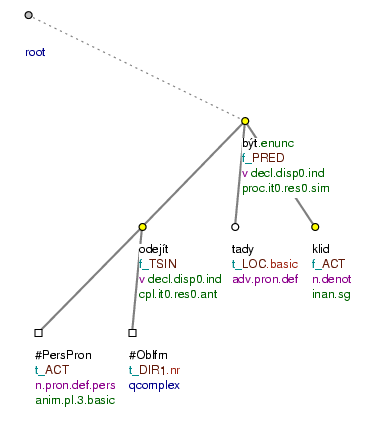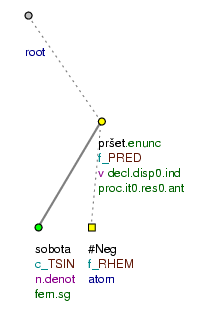- Definition of the
TSINfunctor -
The
TSINfunctor (temporal: since when) is a functor for a free modification that expresses specification of time answering the question "since when?".
A modification with the TSIN functor expresses the beginning of the event expressed by the governing word, either by direct specification of the moment (od pěti hodin (=lit. since five o'clock), odedneška (=since today)), or by specifying the temporal relation to another event (od příjezdu (=lit. since (the) arrival), od snídaně (=lit. since breakfast)).
Forms. The basic forms of TSIN modifications are:
-
prepositional phrase.
The most common forms:
od+2 Expozice je od včerejška otevřena v pražském Centru nezávislé žurnalistiky. (=The exposition has been open since yesterday in Prague Center of Independent Journalism.) počínaje+7 Počínaje snídaní nic nejedl. (=He has not eaten since breakfast.) Example:
Od soboty.
TSINnepršelo. (=lit. Since Saturday (it) has_not rained.) Fig. 7.17 -
adverbial expressions.
Examples:
Znají se odedávna.
TSIN(=lit. (They) know each_other for_ages.)Odjakživa.
TSINjsem neměl rád tohle město. (=lit. Since_ever (I) - do_not_like this town.)Odkdy.
TSINse znáte?(=lit. Since_when each_other have_you_known?)Odvčera.
TSINuž nic nejedl.(=lit. Since_yesterday (he) - anything has_not_eaten.) -
dependent clause.
The most common forms:
co Co jsem skončil školu, hledám práci. (=Since I finished school I have been looking for a job.) Example:
Co odešli.
TSIN, je tu klid. (=lit. Since (they) left (it) has_been here calm.) Fig. 7.18NB! A modification with the
TSINfunctor is only rarely expressed by a dependent clause. A similar temporal modification modifying a noun can, however, be expressed by a dependent clause (its effective root node is assigned theRSTRfunctor); e.g.:Od toho okamžiku.
TSIN, co jsem ho spatřil.RSTR, jsem věděl, že je to on. (=lit. From the moment when (I) - him saw (I) - knew that was it him.)Od doby.
TSIN, kdy jsem ho navštívil.RSTR, uplynulo několik dní. (=lit. Since (the) time when (I) - him visited have_passed several days.)
Figure 7.18. The TSIN functor

Co odešli, je tu klid. (=lit. Since (they) left (it) has_been here calm.)
Border with the TFRWH functor. The TSIN functor is close to the temporal modifications the meaning of which is "from when?" (TFRWH; see Section 3.3, "TFRWH"). However, the distinction between these two functors in a particular context is usually unambiguous. A modification with the TSIN functor always expresses the beginning (of the duration) of the governing event., i.e. the beginning of an interval; the TFRWH functor, on the other hand, has nothing to do with duration or intervals, it only localizes another modification in a moment in the past. Cf.:
-
Od minulého roku.
TSINuž nepracuji. (=lit. Since last year (I) have_not_worked.)Pracuje odvčera.
TSIN(= lit.(He) has_been_working since_yesterday.) -
vstupenka z pondělí.
TFRWH(=lit. (a) ticket from Monday)Zápisy jsou odvčera.
TFRWH(=lit. Registration has_been_running since_yesterday.)Z minulého roku.
TFRWHsi nic nepamatuji (=lit. From (the) last year (I) - anything cannot_remember.)nevykonaná práce od minulého pondělí.
TFRWH(=lit. that_has_not_been_done work since last Monday)
Borders with other functors. Due to the identity in form, the TSIN functor can also border on functors for other than temporal modifications. However, in a particular context the choice of the functor is usually unambiguous. Cf.:
-
Od snídaně mě bolí zuby. (=Since breakfast I have had a toothache.)
The modification od snídaně (=since breakfast) can express the moment when the toothache started (then it is assigned the
TSINfunctor), in a different context, however, (e.g. I had something sweet for breakfast and it makes my teeth ache) the modification od snídaně (=since breakfast) can be assigned theCAUSfunctor, too.
